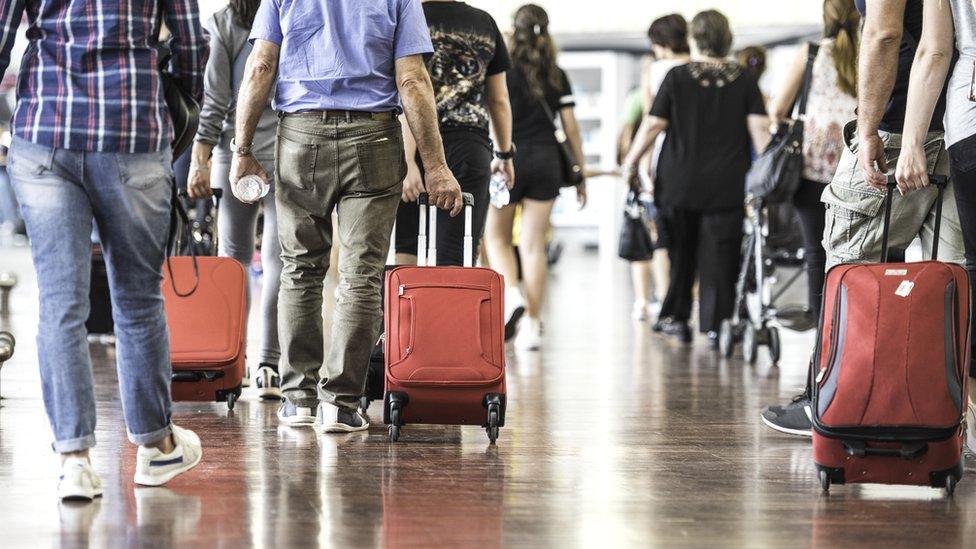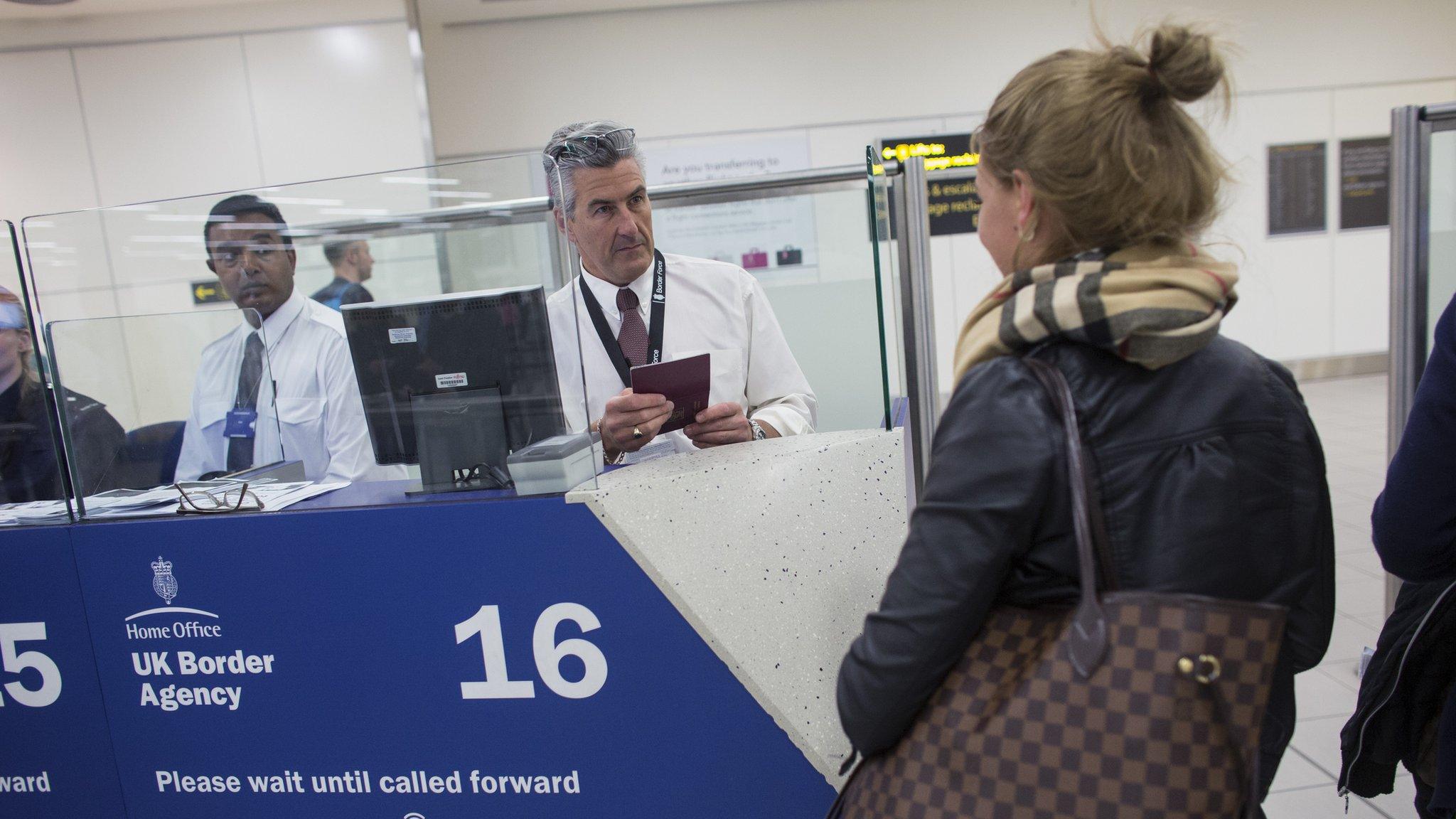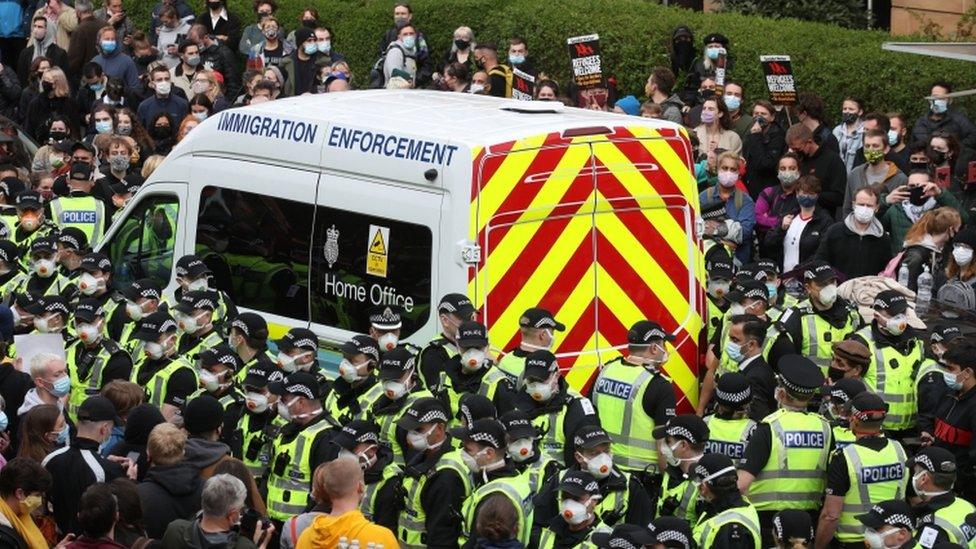Settled status: EU citizens urged to apply to stay in UK now or lose rights
- Published

EU citizens living in the UK have until the end of Wednesday to apply to stay or lose their rights, under post-Brexit rules introduced by the government.
More than 5.6 million applications have been received, but around 400,000 cases are still waiting to be processed.
Ministers say anyone who applies on time will have their existing rights protected while their case is heard.
Labour says many vulnerable people risk losing access to public services and the deadline should be extended.
Under the terms of Britain's departure from the European Union, EU citizens and their families living and working in the UK no longer have an automatic right to do so as freedom of movement has come to an end.
Instead, they have to apply for legal permission to remain under what is known as the EU Settlement Scheme , external(EUSS).
People from the European Economic Area (EEA) countries of Iceland, Liechtenstein and Norway, as well as Switzerland are also affected.
Once granted status, applicants can continue to use the NHS, study and access public funds and benefits, as well as travel in and out of the country.

'It doesn't make you feel very welcome'

Kate (not her real name) was among the first EU citizens to apply for settled status after Brexit, but she did not, initially, realise she also had to register her two-year-old daughter.
The 34-year-old German citizen - who has been living and working in Sheffield for four-and-a-half years - realised her mistake when she saw one of the government's TV ads.
But she had to post her daughter's passport to the Home Office to verify her identity and it has been stuck in the system for weeks, meaning she will miss the deadline.
"Everyone knew this was coming - campaigners have been talking about this for weeks now," says Kate.
"They should extend the deadline. It's just difficult to understand why they are not doing that."
She adds: "It is very worrying, what if they lose my daughter's passport?
"It doesn't make you feel very welcome."

According to provisional Home Office figures to the end of May, 5,605,800 applications have been received since the scheme opened in March 2019 and 5,271,300 have been finalised.
The countries whose nationals have made the highest numbers of applications are Poland (975,000) and Romania (918,000).
Of the concluded applications, more than 2.7 million were granted settled status, allowing them permanent leave to remain in the UK.
A further 2.2 million were given pre-settled status, meaning they need to reapply after living in the country for five years to gain permanent residence.

What is settled status?
EU nationals living in the UK have until 30 June to apply to stay in the UK.
They can apply for:
Settled status - on offer to anyone who can prove that they had been in the UK continuously for five years or more before 31 December 2020. As of 31 May, it has been granted to 2.75 million people.
Pre-settled status - on offer to anyone who had been in the UK for less than five years by the end of 2020. As of 31 May, it has been granted to 2.28 million. They can apply for settled status in future, but there is no guarantee they will get it.

Some 94,000 applications have been refused, 72,100 were withdrawn or void and 74,900 were deemed invalid - where the Home Office decides someone is not eligible to apply or has failed to provide sufficient proof of residence.
Concerns have been raised that thousands of people could fail to register and lose their rights as a result.
Miklos Flora, who lives in Worcester but is originally from Hungary, told Radio 4's PM programme that he has struggled with his application.
He said he applied for himself with his Hungarian ID card but then realised his wife's card had expired and he could not proceed with their application as a result.
"With my kids, the problem is they don't have any kind of ID cards so I have been advised from the Citizen's Advice they are going to send me a form that is around 39 pages that we have to fill out and then send by post," he told PM.


Come Thursday morning, most experts agree that it is highly likely there will be tens if not hundreds of thousands of EU citizens who have suddenly become illegal immigrants.
So, at its worst, the relatively straightforward scheme could become a second and larger Windrush scandal - despite it being designed to avoid a repeat of that injustice in which the Home Office failed to recognise the rights of people who had long been living legally in the country.
So who's not registered? Children could be a huge group because their parents may not realise they are not British.
There may be 130,000 in the benefits system too - and there is anecdotal evidence that even some of the well-heeled may be affected if they are unwittingly relying on an old form of permanent residence.
The impact of Brexit on all these people, and others more vulnerable, may only become clear when they go for a job or treatment on the NHS - and find they've got no right to be in the UK at all.

Labour's Paul Blonfield, who raised the issue in the House of Commons earlier, said there are "several potential problems" not least a significant number of late applications, including from those who cannot get through on helplines.
Speaking to Radio 4, he said he has heard from people who have been holding for eight hours for advice and face losing their status and their rights.
And he said there are particular concerns about children about in care with applications not made for about 1200 young people.
"I pressed for the government to do what other European countries have done in relation to UK citizens and that's recognise that we are going through a global pandemic and extend the deadline so these issues can get sorted out," he said.
"We need to actively reach out" to those people who have not applied he said "because they are the hard to reach groups - those people with language difficulties, perhaps people in care, young people in social care," he added.
Immigration minister Kevin Foster said "the overwhelming majority" of people have now applied and "there are provisions for late applications where people have reasonable grounds for making one".
"We will take a practical and compassionate approach to those who haven't applied particularly where there may be vulnerabilities or obvious reasonable grounds such as children whose parents may not have applied for them."
He said if people have any concerns about their status come the 1st of July "the message is simple - don't delay, apply today".
There is "a range of grant funded support organisations that will help people apply and we have an assisted digital service that people can use if needed" he added.

Are you an EU citizen living in the UK who is yet to apply for settled status? Share your experiences by emailing haveyoursay@bbc.co.uk, external.
Please include a contact number if you are willing to speak to a BBC journalist. You can also get in touch in the following ways:
WhatsApp: +44 7756 165803
Tweet: @BBC_HaveYourSay, external
Please read our terms & conditions and privacy policy
If you are reading this page and can't see the form you will need to visit the mobile version of the BBC website to submit your question or comment or you can email us at HaveYourSay@bbc.co.uk, external. Please include your name, age and location with any submission.
Related topics
- Published29 June 2021
- Published23 June 2021

- Published24 May 2021

- Published23 May 2021
